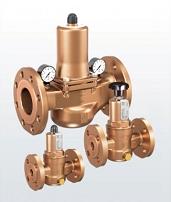I. Inherent Advantages of Brass as a Material
The selection of brass for check valve factory construction is predicated on several material properties that offer distinct benefits in many operating environments.

Corrosion Resistance: Brass demonstrates a good level of resistance to corrosion, particularly in water-based systems. It withstands oxidation and degradation from water and water vapor more effectively than carbon steel. This inherent resistance prolongs the valve's service life in environments like domestic hot and cold water lines, where rust formation would be a concern with ferrous metals.
Machinability and Strength: Brass is a material that is easily machined, allowing for the manufacture of complex internal components and ensuring precise tolerances in the valve seat and disc mechanism. This facilitates a reliable seal against backflow. Furthermore, brass possesses a structural strength that is sufficient for a wide range of low to medium-pressure applications, providing a robust housing without the brittleness associated with some plastic alternatives.
Cost-Effectiveness: When compared to valves made from more specialized corrosion-resistant alloys like stainless steel or bronze, brass check valves generally present a lower initial cost. This economic advantage makes them a frequent choice for budget-conscious projects and high-volume production where the performance parameters of brass are adequate for the intended service.
II. Functional and Mechanical Disadvantages
Despite its favorable traits, brass has inherent limitations that can restrict its use in certain systems and under specific operational conditions.
Susceptibility to Dezincification: In water with specific chemical properties, particularly soft water with a slightly acidic pH and a high concentration of chlorides, brass can undergo a selective leaching process called dezincification. In this process, zinc is selectively removed from the alloy, leaving behind a porous, weakened copper structure. This compromises the mechanical integrity of the valve and can premature failure. Valves identified for such environments should be made from dezincification-resistant (DZR) brass or alternative materials.
Temperature and Pressure Limitations: The mechanical strength of brass decreases at elevated temperatures. Consequently, brass check valves are not typically recommended for sustained high-temperature steam service or high-pressure applications that exceed the alloy's creep strength. Their operational envelope is generally confined to lower pressure and temperature ranges when measured against valves constructed from steel or certain copper-nickel alloys.
Limited Chemical Compatibility: While resistant to water, brass is vulnerable to attack from a range of chemicals. It is not suitable for systems carrying ammonia, amines, strong acids, or caustic solutions. Its use in many industrial chemical processing plants, marine applications, or refrigerant lines is therefore limited, necessitating the selection of more chemically inert materials.
III. Application-Specific Considerations
The decision to use a brass check valve is often determined by a careful weighing of its advantages against its disadvantages within the context of a specific application.
Suitability for Residential Plumbing: In this domain, the advantages of brass check valves are frequently prominent. They are well-suited for the moderate temperatures and pressures of household water systems. Their corrosion resistance ensures a reasonable service life, and their cost-effectiveness aligns with residential construction budgets. They are commonly used on water heater inlets and to prevent backflow in branch lines.
Concerns in Industrial and Specialized Systems: For industrial processes involving aggressive chemicals, high-purity water requirements, or elevated operating parameters, the disadvantages of standard brass become more critical. The risk of dezincification or chemical corrosion makes brass an unsuitable choice. In these settings, stainless steel, PVC, CPVC, or specialized alloys are often specified to ensure system integrity and safety.
Performance Compared to Alternative Materials: The performance of a brass check valve must be evaluated relative to other options. For instance, while plastic valves offer chemical resistance to many substances and are immune to dezincification, they may not possess the same mechanical strength or temperature tolerance as brass. Conversely, while stainless steel valves offer greater strength and corrosion resistance, they do so at a higher material cost. The choice of brass, therefore, often represents a middle ground.
 +86-576-82686004
+86-576-82686004
 allen@badavalve.com / daisy@badavalve.com
allen@badavalve.com / daisy@badavalve.com





 EN
EN
 Español
Español










